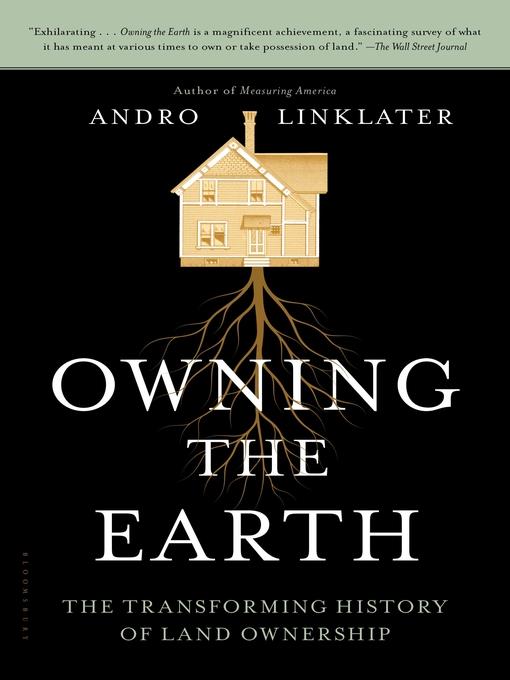
Owning the Earth
The Transforming History of Land Ownership
- اطلاعات
- نقد و بررسی
- دیدگاه کاربران
نقد و بررسی

Starred review from September 23, 2013
In this masterly work, Linklater (Measuring America) views modern history through the lens of land ownership, considering a variety of modes that includes private ownership, ownership by the state or its ruler, and the communalism found in many traditional societies. While he concentrates on the United States and other major economies, his geographic scope also touches on all continent with arable land, with examples from countries as diverse as Borneo and Sweden. Linklater begins his history in the 1500s, when the idea first appeared that common men might own a piece of land, and extends through recent economic upheavals to the present day. His intellectual range is as wide as his geographic or temporal range, spanning from Hobbes to Greenspan and including philosophers, politicians, religious figures, and academics; an extensive notes section and bibliography allow readers to further pursue his source ideas. For Linklater, private property is paradoxical because “although it promotes individuality, it only works by giving equal weight to the public interest.” By focusing on land ownership, the emphasis in historical interpretation shifts from economics to politics, giving a much different perspective. This reinterpretation of global history will give readers of history, politics, and economics much to think about. Agent: Peter Robinson; Rogers, Coleridge, & White (U.K.)

November 1, 2013
A pertinent, wide-ranging comparative study of the unleashing of the "monster" of private property, which has both enriched and enslaved populations. English historian Linklater (Why Spencer Perceval Had to Die: The Assassination of a British Prime Minister, 2012, etc.) focuses on the history of land ownership as driving human activity from the earliest ages and being the key to the creation of democracy. Were people merely custodians of the land, which belonged to God first and deputized to his representative on Earth, the monarch? Indigenous societies across North America, the Australian Outback and African savannah believed the land was communally owned and used, while in most of the rest of the world--e.g., Russia, China and India--"peasants worked, landlords possessed, but ultimately the earth was deemed to belong to its creator." Evolving from the collision of crown and chief barons that resulted in the Magna Carta, the impetus for owning land gained steam in the 1500s in England with the land revolution, which displaced subsistence farming via the feudal system in favor of a few rich owners profiting from the buying of land and increasing yields. Enclosures went up, Henry VIII seized monastic land, populations grew and the Pilgrims, flung across the sea in their biblical experiment, decided that possession of New England was earned by the human toil put into it. Linklater pursues the clarification of the rights to private property through writings by Richard Overton, Thomas Hobbes and John Locke, among others, and the emergence of "two capitalisms": one, the Dutch model, top-heavy and feudal; the other, unregulated and guided by the "invisible hand" of supply and demand a la Adam Smith. Yet what makes Linklater's study truly useful is his comparative global view, exploring conditions within Russia, Poland, the Ottoman Empire to China and India, and through the present real estate market crash. Vast, evenhanded and worthy of rumination.
COPYRIGHT(2013) Kirkus Reviews, ALL RIGHTS RESERVED.

December 1, 2013
Prompted by the 2009 global financial crisis, Linklater (Measuring America: How the United States Was Shaped by the Greatest Land Sale in History) set out to understand and explain the origins of such events in the politics of private land ownership. He presents a narrative and an argument, the narrative beginning in the author's 15th-century home in England, which dates from the time that the concept of private ownership of land began there. Linklater goes on to chronicle the transformation of land ownership around the globe--ranging from Russian feudalism to India's Green Revolution and beyond--culminating in the wealth disparities left by the systemic failure of property-driven democracy on both sides of the Atlantic. Linklater provides this account as support for his argument that politics, with its attention to rights and ownership, offers a more sustainable basis for society than does economics, with its growth imperative. His accessible historical anecdotes, more compelling as narrative than argument, will appeal to readers of popular history, e.g., Simon Winchester's The Men Who United the States: America's Explorers, Inventors, Eccentrics and Mavericks, and the Creation of One Nation, Indivisible. In contrast to Winchester's primary focus on human protagonists, the theme of land ownership unifies Linklater's narrative. He emphasizes the implications of land ownership on American democracy. VERDICT Recommended for readers interested in well-documented yet comprehensible and not overly academic global histories. [See "More of the Best," p. 29.--Ed.]--Jennifer M. Miller, Univ. of Southern California, Los Angeles
Copyright 2013 Library Journal, LLC Used with permission.




دیدگاه کاربران